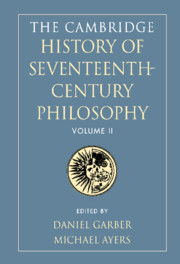36 - Reason, the passions, and the good life
from VII - Will, Action, and Moral Philosophy
Published online by Cambridge University Press: 28 March 2008
Summary
INTRODUCTION
That the passions are both wayward and destructive is one of the commonplaces of seventeenth-century thought. Plays, religious tracts, meditational manuals, educational handbooks, maxims, and philosophical treatises all emphasise this conviction, remorselessly probing the hazards posed by our emotions and desires. To be passionate is to be blinkered and impressionable, vulnerable and a threat to others. At the same time, it is part of our natural condition, an endowment with which we are born and which we rarely escape.
This fundamental fact about human nature is held to be compatible with a vast diversity of temperaments. Among the many factors that may have a hand in shaping our individual emotional dispositions are the circumstances of a child’s conception, the social position of its family, its experiences in the womb, the climate in which it grows up, its education, the chance associations and repetitions of events it encounters, and the presence or absence of divine grace. But the processes by which our passions are channelled or modified do not usually create well-rounded and balanced personalities. On the contrary, adults are often left with powerful contradictory affections and thus remain vulnerable to destructive conflicts of emotion. Sometimes, as seventeenth-century drama vividly reminds us, this flaw in human nature can be the cause of tragedy; and at a less apocalyptic level its effect is to make people inconstant and restless, driven from one emotion to the next as waves on the sea are driven by the wind.
- Type
- Chapter
- Information
- The Cambridge History of Seventeenth-century Philosophy , pp. 1358 - 1396Publisher: Cambridge University PressPrint publication year: 2000
References
- 3
- Cited by



